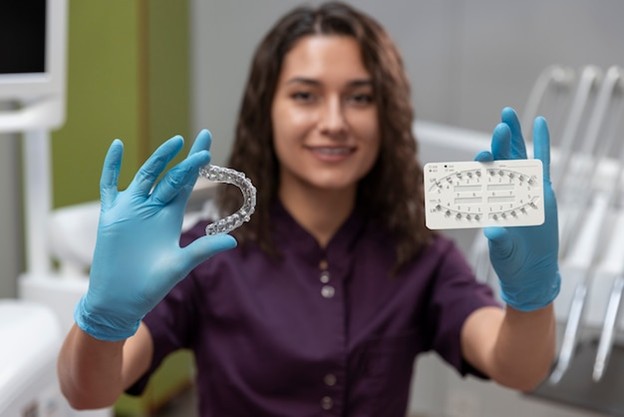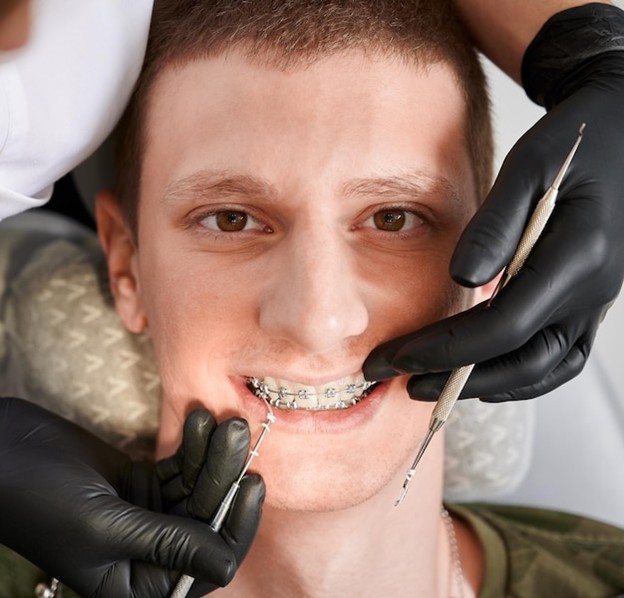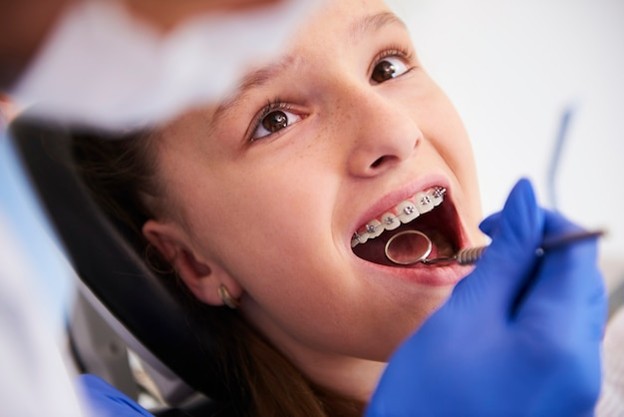
Looking to straighten your smile but not sure whether to choose clear aligners or traditional braces? You’re not alone. Many adults and teens want a straighter smile but feel hesitant about visible metal braces. Thankfully, advancements in modern orthodontics offer more subtle and flexible options—especially clear aligners for adults.
At Ballantrae Dental, your trusted Stouffville Invisalign provider, we help patients choose the right orthodontic solution based on their lifestyle, goals, and treatment needs. In this guide, we’ll compare clear aligners vs braces in terms of appearance, cost, effectiveness, comfort, and more—so you can make an informed decision.
What Are Clear Aligners?
Clear aligners are a series of transparent trays that gently move your teeth into proper alignment. Each tray is custom-made using advanced digital imaging and is worn for 20–22 hours a day, typically changed every 1–2 weeks.
Key Benefits of Clear Aligners:
- Nearly invisible while worn
- Removable for meals and oral hygiene
- Fewer office visits than braces
- No wires or brackets to irritate the mouth
- Predictable results using digital technology
Clear aligners are ideal for adults who want to straighten their teeth discreetly, without disrupting their daily routine or professional appearance.
What Are Traditional Braces?

Traditional braces use metal or ceramic brackets bonded to the teeth and connected with wires that are adjusted periodically to move the teeth into place.
Key Benefits of Braces:
- Effective for complex alignment and bite issues
- No need to remember to wear them (non-removable)
- Generally lower cost for more advanced cases
- A long-standing and proven orthodontic method
Braces can treat more severe cases that aligners may not be suitable for, such as significant bite problems or complex rotations.
Clear Aligners vs Braces: Side-by-Side Comparison
|
Feature |
Clear Aligners |
Traditional Braces |
|
Appearance |
Virtually invisible |
Visible metal or ceramic |
|
Comfort |
Smooth plastic, no sharp edges |
May cause irritation and sores |
|
Removability |
Removable for eating and brushing |
Fixed; cannot be removed |
|
Hygiene |
Easy brushing and flossing |
More difficult around brackets |
|
Dietary Restrictions |
None |
Avoid sticky, hard foods |
|
Treatment Time |
6–18 months |
18–24 months (varies) |
|
Ideal for |
Mild to moderate alignment issues |
Moderate to complex issues |
How to Choose Between Clear Aligners and Braces
Choosing the right option depends on your individual needs, lifestyle, and preferences.
Choose clear aligners if:
- You want a discreet option
- You have mild to moderate alignment issues
- You’re disciplined about wearing aligners
- You prefer fewer dental visits
- You value comfort and convenience
Choose braces if:
- You have complex bite issues
- You need comprehensive alignment correction
- You don’t want the responsibility of removable trays
- You’re okay with a more visible solution
During your dental checkup at Ballantrae Dental, we’ll assess your teeth and bite to determine which solution is right for you.
Orthodontic Treatment Timeline

On average:
- Clear aligners take 6–18 months for most adults
- Braces may take 18–24 months, depending on the complexity of the case
At Ballantrae Dental, we use digital treatment planning to simulate your final smile before you even begin, giving you a preview of your transformation.
Invisalign for Teens and Adults
While we specialize in clear aligners for adults, Invisalign also offers teen-friendly versions. These include compliance indicators to help parents and dentists monitor wear time.
Clear aligners are a great choice for:
- Young adults heading into college
- Professionals seeking discreet options
- Parents balancing family and self-care
Learn more about aligner-based care in our blog:
Clear
Aligners for Adults: The Discreet Way to Straighten Your Smile
Oral Hygiene and Maintenance
Clear aligners make it easier to maintain oral health because they can be removed while brushing and flossing. Braces, on the other hand, require special tools to clean around wires and brackets.
To keep your smile healthy during treatment, we recommend regular dental hygiene appointments and personalized preventive dental care.
Trusted Canadian Perspective
As the Canadian Association of Orthodontists explains, both aligners and braces are effective when prescribed and monitored by a trained dental professional. The key is choosing the method that fits your dental condition, lifestyle, and commitment to treatment.
FAQs: Clear Aligners vs Braces
Q: Do clear aligners really work for adults?
Yes! Clear aligners are
extremely effective for adults with mild to moderate alignment needs. They’re especially
popular for those who had braces in the past but experienced orthodontic relapse.
Q: What if I lose an aligner?
We can usually provide a replacement or
adjust your treatment plan accordingly. It’s important to let us know right away.
Q: Are clear aligners painful?
You may feel mild pressure with each new
set, but they’re generally more comfortable than braces.
Q: Can I switch from braces to aligners?
Possibly. In some cases, we can
transition you from braces to clear aligners mid-treatment.